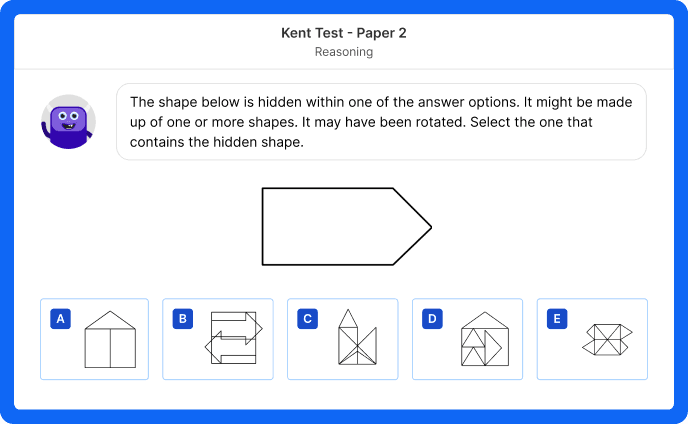Contents
Thinking about applying to The Judd School? Find out everything you need to know about admissions and how to prepare your child for success in the Kent Test.
Key information for The Judd School
Address: The Judd School, Brook St, Tonbridge TN9 2PN
Number of pupils: approx 1,500
Admissions contact: [email protected]
Number of places in Year 7: 180
11+ exam: Kent Test
Catchment area: yes
Dates for your diary
11+ registration opens: early June 2024
11+ registration closes: early July 2024
11+ exam date: early September 2024
11+ results released: mid-October 2024
Secondary school application deadline: 31st October 2024
School allocations: 3rd March 2025
About The Judd School
Founded in 1888, The Judd School is a large boys’ grammar school in Tonbridge. Ofsted consistently deems it excellent. They push students to do well academically and build their strength and character.
The school motto is 'Learn, Grow, Belong.' Students get man opportunities to grow socially, academically, and personally. There is a broad variety of clubs, visits and activities on offer. The school is known for it's top-notch sports facilities, with 26 acres, six rugby fields, and top-notch cricket squares
How to apply to The Judd School
The Judd School is a selective school. This means that your child will need to take the 11 plus exam to be eligible for a place. In Kent, the 11 plus is known as the Kent Test.
Registration for the 2024 Kent Test opens in early June 2024 and closes in early July 2024. The exam will take place in September 2024 and you’ll receive your child’s results in mid-October. You can then use these results to decide whether to apply for a place at The Judd School.
To apply, you’ll need to name the school as one of your preferred schools on the secondary school common application form. This will be available on your home council website from early September and must be submitted by Thursday 31st October 2024.
Remember – passing the 11 plus doesn’t guarantee that your child will be allocated a place at your preferred school. Many grammar schools are often oversubscribed with qualified children. Schools and their admissions authorities work through admissions criteria to prioritise children for places. We’ve included the admissions criteria for The Judd School below.
What subjects are on the Kent Test?
Children applying to The Judd School take the Kent Test. This consists of two multiple-choice papers which are supplied by GL Assessment.
One paper lasts one hour and assesses English and maths. These questions are based on the Key Stage 2 national curriculum.
The other paper lasts one hour and tests verbal reasoning, non-verbal reasoning and spatial reasoning. These subjects are not taught at school, so your child might be unfamiliar with these styles of questions.
Guide to the Kent Test
Find out everything you need to know in our complete guide to the Kent Test. Plus, get access to free 11 plus resources to help your child feel confident for their exam!
How does place allocation work at The Judd School?
Your child will get three standardised scores in the Kent Test – one each for English, maths and reasoning. They will also get one total (aggregate) score. Children need a total score of 332 or higher and no single score lower than 107 to qualify for a place at a Kent grammar school.
Up to four places each year are reserved for students with an Education, Health and Care Plan (EHCP) who have a diagnosis of Autism Spectrum Disorder. Any other children who have an EHCP naming the school are then offered a place. These places are in addition to the PAN of 180.
If more than 180 children applying to The Judd School achieve these scores, the school applies oversubscription criteria.
Oversubscription Criteria:
1. Inner area
152 places are offered to children living in the inner area, using these oversubscription criteria:
Looked After or previously Looked After Children, and children who have been in state care outside of England, who pass the Kent Test.
Academic ability in order of ranked total score on the Kent Test.
Where scores are the same, students are ranked by distance from home to school, with the nearest given highest ranking.
Random selection is used if two or more applicants have the same score on the Kent Test and the same distance from home to school.
Up to five places are offered to students living in the inner area who get free school meals, ranked according to their Kent Test score. Any unallocated places from these five are offered to students eligible for Pupil Premium.
2. Outer area
23 places are allocated to children living in the outer area, using these oversubscription criteria:
Looked After or previously Looked After Children, and children who have been in state care outside of England, who pass the Kent Test.
Academic ability in order of ranked total score on the Kent Test.
Where scores are the same, students are ranked by distance from home to school, with the nearest given highest ranking.
Random selection is used if two or more applicants have the same score on the Kent Test and the same distance from home to school.
The Judd School Catchment Area
As part of its admissions policy, The Judd School prioritises children who live in its 'inner area'. The inner area is defined as these postcodes:
157 places will be allocated to students resident in the Inner Area, which is defined by the following postcodes:
TN1, TN2, TN3, TN4, TN8, TN9, TN10, TN11, TN12, TN13, TN14, TN15; ME18, ME19; TN16 1** and TN16 2** (not TN16 3** or TN16 9**); DA4 0** (not DA4 9**). Plus the civil parish of Halstead (where this is not included above).
The Outer Area
23 places will be allocated to students resident in the Outer Area which is defined as being outside the Inner Area (above) and within England.
Atom’s top tips for Kent Test preparation
The Kent Test is designed to select local children working at the top ability range in their year group. Here are our top tips to help you and your child feel confident for exam day!
Bitesize learning
It’s important to build a good knowledge base before the Kent Test. Using a ‘little and often’ approach when learning is key – our brains encode new information more effectively when dealing with smaller ‘chunks’ of information. For children aged 10–11, child psychologists recommend regular study sessions of 20–30 minutes.
Atom Home makes learning a more enjoyable process for your child. They'll explore exciting worlds full of interactive questions, earning coins to spend in the Atom shop. Atom adapts to your child, showing them questions at just the right level of difficulty to keep them motivated.
Read widely
In the Kent Test, your child will need to analyse and interpret written information. Regular reading is a great way to build these skills.
Encourage them to read books from different genres and by a diverse range of authors. Increasing the variety of your child’s reading will help them understand different styles, tones and purposes. Meanwhile, reading a little every day will help widen their vocabulary, sharpen their analytical thinking, and enhance their imagination.
Refine exam technique
When your child feels confident with the topics they’ve learnt in Year 5, they’ll be ready to put their knowledge to the test.
Practice tests can help your child develop problem-solving skills and build confidence working under test conditions. They’re also a great way to consolidate learning and highlight knowledge gaps for further improvement.
With Atom Home, you'll unlock online mock tests and printable practice papers. Enjoy automatic marking and progress tracking with the online tests, and help your child get familiar with the real exam experience with printable practice papers.
Celebrate progress
Setting regular, achievable goals and celebrating your child’s progress – no matter how big or small – will help keep their motivation high.
Make sure to encourage a growth mindset. This means celebrating effort, as well as achievement! When your child makes mistakes or struggles to understand a particular topic, help them understand that they’ll improve through practice. Regular praise will help your child improve their resilience when tackling new and challenging topics.
Tailored preparation for the Kent Test
Wish you could give your child a roadmap to success in the Kent Test? You can. Atom Home has everything you need to get prepared, in one package.
You don't need a tutor to get into your top-choice grammar school. You just need Atom. We’ll create a tailored plan for your child and support them along their fun revision journey.
Online and printable Kent Test practice papers
90,000+ adaptive questions
500+ hours of on-demand video lessons
Automatic marking and instant progress data
Navigate the Kent Test with confidence.
Start your free trial today. Our local admissions specialists will get to work on your child’s plan. Relax, Kent Test prep is sorted.
Contents


